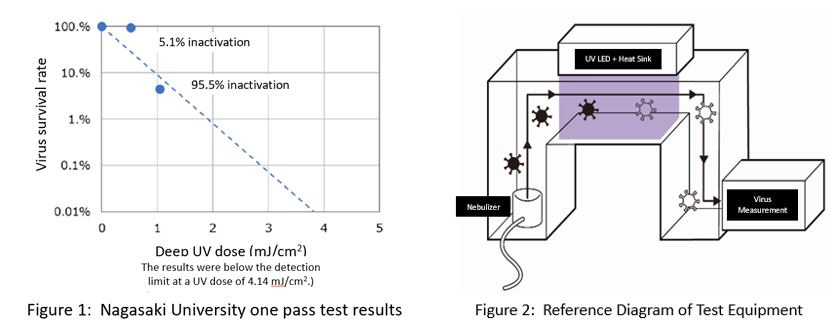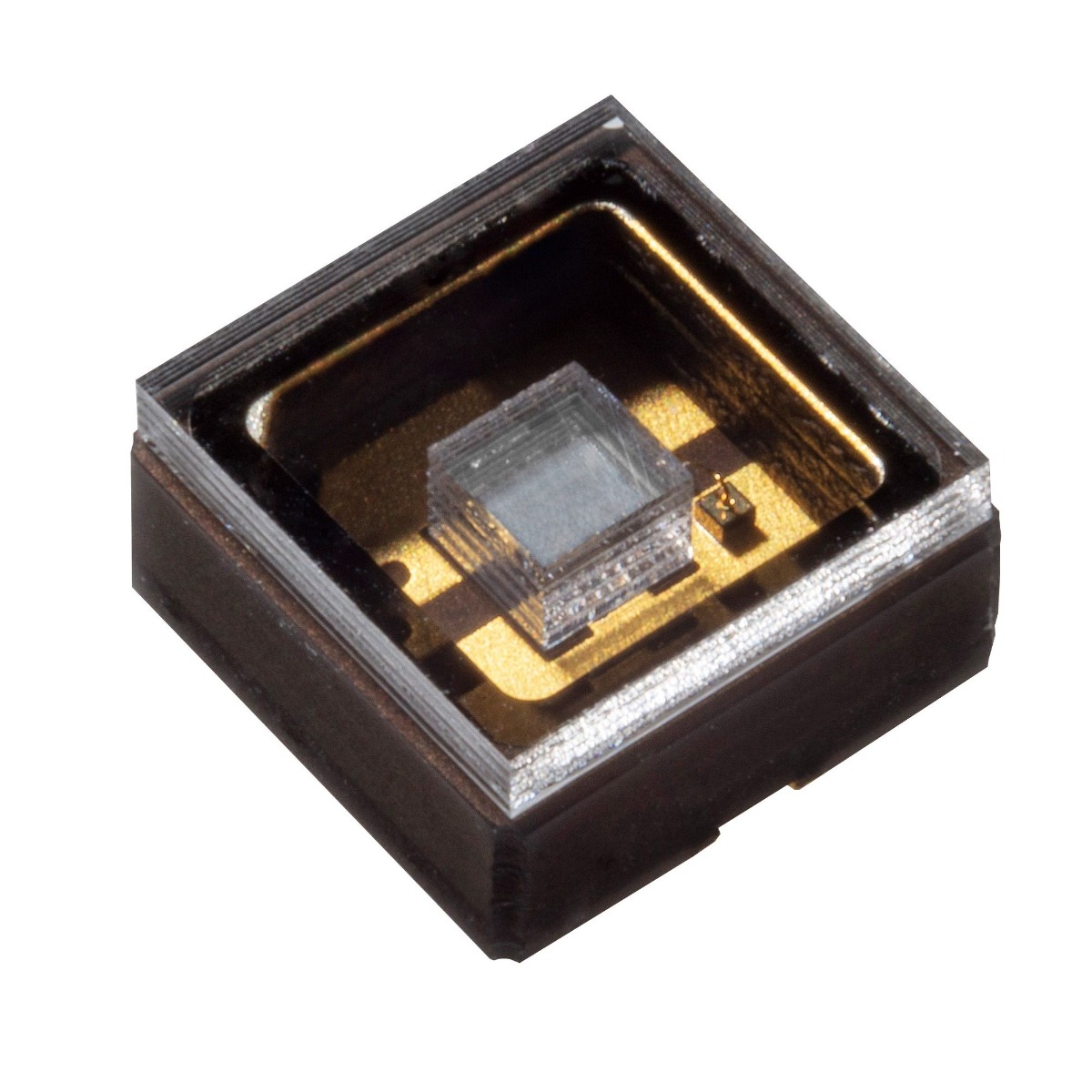New Nichia NCSU434C High Radiant Flux & Density UV-C LED with 110mW
- By Ledrise Led Professional
- Feb 15, 2023

The COVID-19 pandemic has led to a surge in the demand for efficient disinfection and sterilization technologies, particularly in public spaces such as hospitals, schools, and offices. Traditional disinfection methods, such as mercury lamps, can be harmful to the environment and human health. This is where Nichia's NCSU434C UV-C LED comes in - a compact and powerful ultraviolet LED designed for efficient inactivation and sterilization of various bacteria and viruses, including the SARS-CoV-2 virus responsible for COVID-19.
The NCSU434C is a high-performance UV-C SMD LED with a typical radiant power of 110mW and 280nm wavelength. Its small size, 3.5mm x 3.5mm, and high radiant flux make it an excellent choice for smaller and more dense designs, and its 120-degree viewing angle and dimensions make it ideal for disinfection and sterilization applications.
One of the significant advantages of Nichia's UV-C LED technology is its germicidal efficacy, capable of deactivating a wide range of pathogens in the UV-C band (100–280 nm), including the SARS-CoV-2 virus. This makes it an ideal choice for use in water, near-surface, and air disinfection systems. Nichia also prioritizes both radiant flux and lifetime in the development of its LEDs, ensuring effective germicidal dosage over time. The company guarantees a minimum 10,000-hour reliability at L70 and realistic high temperatures for its UV-C LEDs, ensuring long-lasting and dependable performance.
In addition to its exceptional performance levels, the NCSU434C is also an environmentally friendly option. Its innovative design, coupled with Nichia's commitment to sustainability, makes it an ideal choice for customers seeking to replace traditional mercury lamps with energy-efficient LED systems. Nichia promises to continue to develop not only deep-ultraviolet LEDs but also higher-power ultraviolet LEDs with improved performance to help solve various social issues and assist in achieving a mercury-free and carbon-free society through energy conservation.
The NCSU434C UV-C LED can be integrated into various large flow water and air disinfection equipment for the inactivation of various viruses, including the new coronavirus, and sterilization of bacteria. Its compact form factor, high radiant flux, and proven germicidal efficacy make it an excellent choice for a wide range of applications. Below are some potential applications for Nichia's NCSU434C UV-C LED technology:
Water Disinfection Systems: The NCSU434C can be integrated into water treatment systems to effectively inactivate harmful pathogens, ensuring safe and clean water for consumption or use in various industries.
Air Purification Systems: UV-C LED technology can be used in air purification systems to deactivate airborne bacteria and viruses, improving indoor air quality and reducing the risk of infection in residential, commercial, and public spaces.
Surface Disinfection Systems: The NCSU434C UV-C LED can be employed in surface disinfection systems, such as handheld sanitizing devices or automated robotic cleaners, to sterilize high-touch surfaces in healthcare facilities, schools, offices, and other public spaces.
Medical and Laboratory Equipment: UV-C LED technology can be used in medical and laboratory equipment to ensure sterile conditions and prevent cross-contamination, enhancing safety and reducing the risk of infection in these critical environments.
Nichia's commitment to innovation and sustainability makes it a leader in the industry. Nichia consistently pushes the boundaries of UV-C LED technology, with the NCSU434C offering significant advancements over its predecessor, the NCSU434B LED. Despite its smaller size, the NCSU434C nearly matches the NCSU334B in radiant flux, demonstrating Nichia's commitment to ongoing innovation.

The applications of UV-C LED technology are vast and varied. One of the most critical applications is in water disinfection systems. The NCSU434C can be integrated into water treatment systems to effectively inactivate harmful pathogens, ensuring safe and clean water for consumption or use in various industries. Additionally, the NCSU434C is ideal for air purification systems that help deactivate airborne bacteria and viruses, improving indoor air quality and reducing the risk of infection in residential, commercial, and public spaces.
The NCSU434C UV-C LED can be employed in surface disinfection systems, such as handheld sanitizing devices or automated robotic cleaners, to sterilize high-touch surfaces in healthcare facilities, schools, offices, and other public spaces. These devices have become increasingly popular since the onset of the COVID-19 pandemic and are likely to remain in demand in the future.
UV-C LED technology can also be used in medical and laboratory equipment to ensure sterile conditions and prevent cross-contamination, enhancing safety and reducing the risk of infection in these critical environments. The NCSU434C is an ideal choice for these applications due to its compact form factor, high radiant flux, and proven germicidal efficacy.
Nichia's commitment to innovation and sustainability sets it apart from other LED manufacturers. The company promises to continue to develop not only deep-ultraviolet LEDs but also higher-power ultraviolet LEDs with improved performance to help solve various social issues and assist in achieving a mercury-free and carbon-free society through energy conservation. This commitment to innovation and sustainability makes Nichia a leader in the industry and sets a new standard for other LED manufacturers to follow.
In addition to the NCSU434C, Nichia offers a broad range of LED products for various applications, including automotive lighting, backlighting, and general illumination. Nichia's LED products are known for their exceptional quality, reliability, and performance, and the company has established itself as a leading manufacturer of high-quality LED products.
Nichia's dedication to research and development has resulted in several groundbreaking technologies, including the development of high-brightness blue and white LEDs, which have revolutionized the lighting industry. With the introduction of the NCSU434C, Nichia continues to push the boundaries of what's possible, contributing to a safer and healthier world.
Nichia's NCSU434C UV-C LED represents a significant breakthrough in germicidal technology, providing a compact and powerful solution for efficient inactivation and sterilization of various bacteria and viruses, including the SARS-CoV-2 virus. Its small size, high radiant flux, proven germicidal efficacy, and long-lasting performance make it an ideal choice for a wide range of applications, such as water disinfection systems, air purification systems, surface disinfection systems, and medical and laboratory equipment.
As the world continues to grapple with the COVID-19 pandemic, there has been an increased focus on the importance of maintaining clean and sanitary environments. UV-C LED technology represents a significant step forward in the fight against harmful pathogens, and the NCSU434C is at the forefront of this technology.
With ongoing innovation and continuous improvements in UV-C LED technology, Nichia continues to push the boundaries of what's possible, contributing to a safer and healthier world. The NCSU434C UV-C LED is commercially available now and can be purchased from Ledrise, offering an effective solution for various disinfection and sterilization needs. As the world continues to change and evolve, Nichia's commitment to innovation and sustainability will continue to set it apart from other LED manufacturers and position it as a leader in the industry.








